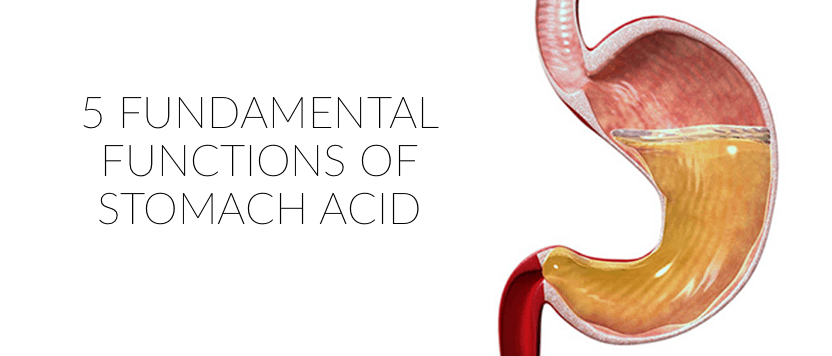Every day, millions of Americans turn to antacid medications, from calcium-based tablets to proton pump inhibitors, to erase symptoms of heartburn. But before reaching for those tablets, let’s consider the following question: Is it wise to reduce stomach acid production?
Why do we have stomach acid? What happens if we have less? While reducing your stomach acid is a choice the medical profession seems to want you to make to fight your heartburn, ironically, it is actually a choice to poorly digest your food, to invite foodborne illness from invading bacteria and viruses, and to block your absorption of important macro and micronutrients! And while antacids may seem like a great short-term choice, there are actually several other ways of addressing heartburn with food, lifestyle and supplementation choices- that work to address the underling cause of heartburn without doing additional harm.
- Protection from Pathogens
Vultures eat carrion and produce incredibly strong stomach acid, strong enough to dissolve metal at a pH of 1, which they vomit onto their food to both sterilize it and pre-digest it before they eat it. By contrast, human stomach acid has a pH of somewhere between 1 and 3. Sorry to ruin your appetite, but the key point is that the more likely one is to be exposed to infectious bacteria or eat animal protein, the more stomach acid one needs.
Because your digestive tract is constantly exposed to what is “outside” of you, stomach acid is your front line of defense against food-borne infection. Luckily, most of the bacteria, viruses, and protists that can do you harm cannot survive a pH under 2. Consider that until modern times, not just food, but also water, carried a far higher risk of illness. Stomach acid is only a first-line defense: your good gut bacteria also fight the bad guys. Then, if these initial rounds of chemical warfare fail, your immune system army takes it from there.
- Chewing and Churning: Powerful Protein Digestion
Your stomach is where you start denaturing (unfolding) protein you eat. Protein is like a giant ball of wadded up string: to digest it, or cut it, you first need to unravel it into one long line. Your stomach uses heat, acid, chemical knives (digestive enzymes), and physical churning to denature proteins and break them into smaller pieces. You will not digest protein with grace if you have insufficient stomach acid- in fact, you may find you have more gas and bloating downstream and are not absorbing all of the protein you eat! Some people notice that after eating a large piece of protein, such as meat, their meal seems to remain in the stomach for a long time, undigested. This is a sign of under-producing stomach acid in general or eating while too stressed to make enough acid.
Proteins that get past your stomach and small intestine without being broken down can still get through the gut lining if it is “leaky,” or not sealing well. This “leaky gut” condition is very common in those with chronic stress and inflammation. For many, this is how food sensitivities begin, as the immune system freaks out in response to proteins being where they shouldn’t. Immune cells incorrectly assume that these proteins, innocent though they may be from healthful foods, are up to something nefarious.
Another catch is that your stomach is made of protein and it can easily damage itself. Making stomach acid takes a lot of energy and maintaining the lining of your stomach with the constant acid damage also takes a lot of energy. When we get chronically tired, stressed, and fatigued, we tend to make less stomach acid, repair our gut lining more slowly, and slow digestion across the board. This paves the way for stomach ulcers- not due to over-producing stomach acid, but rather due to under-protecting the stomach lining. This connection is easily seen, for example, in people with an under-active thyroid (a lower body thermostat)- with less energy comes less stomach acid production.
Usually, your stomach makes a thick coating of mucus to line the stomach, protect it from acid damage, and help it seal as it heals. Even less concentrated stomach acid can damage your cells. Like stomach acid, mucus production falters during chronic stress. So without that protection, acid (even less acid) can gnaw at your stomach lining, causing pain and inflammation. In the same way, if acid gets out of your stomach and gurgles up into your esophagus, those cells can withstand damage until their mucus lining wears thin, resulting in heartburn and damage.
- Making Minerals Matter
Not only does stomach acid help you digest protein, but it also helps you absorb minerals. Minerals are tiny pieces of metal in solution, so in an acidic solution, they form salts and become more soluble. This means that low stomach acid can sabotage your iron, calcium, magnesium, and zinc levels- and that’s just a few of the major mineral players! Low stomach acid could single handedly contribute to iron deficiency anemia, fatigue, osteoporosis, diabetes, high blood pressure… minerals are fundamental. Magnesium is involved in hundreds of key reactions, including those that fundamentally power our cells. To make digestive matters worse, zinc deficiency can contribute to a leaky gut because it helps cells hold tightly together. Considering that most of us are likely to be magnesium deficient, absorbing what we eat is critical. More and more connections are being made between low stomach acid and mineral deficiencies. For instance, researchers reviewing the literature on people who used long term proton pump inhibitors indicate an association with osteoporosis alongside poor absorption of calcium, magnesium, and vitamin B12.
- Boosting your B’s
Concern about vitamin B12 levels in the elderly, who have low stomach acid simply as a function of age, laid the foundation for researchers to look at the effect of stomach acid on absorbing B vitamins. B vitamins like B12 require an acidic environment for absorption (B12 also requires a special protein helper, so it is even trickier) in your small intestine. That acidic environment also chemically prepares certain B vitamins for methylation, an activating step, in your liver. Remember- the pH in the beginning of your small intestine is set up by what your stomach is dumping into it. What is upstream affects what is downstream.
- Acid Sets up Downstream Digestion
What about Heartburn? Heartburn correlated with high stress is often due to low stomach acid production – not too much! Heartburn with a lot of gas and bloating could be signs that your food isn’t being completely digested, and stomach acid may be a key part of that deficient digestion. Consider:
- The sphincter that connects your esophagus to your stomach might not close completely because it stays open when we are stressing out and closes when we actually can rest enough to digest. Small amounts of acid will still cause great discomfort if this occurs, leading to heartburn.
- The sphincter that connects your stomach to your small intestine has a threshold acidic pH it needs to sense in the lower stomach to open. Until that occurs, food will continue to sit in your stomach, incompletely digested, causing a feeling of fullness and even acid reflux, leading to heartburn.
Does concern about antacids mean you shouldn’t address your heartburn? Of course not! But consider how you will address it- start with diet, de-stressing, exercise, sleep, and hydration. Do no harm. In fact, many people with heartburn find that using digestive enzymes to help digestion and boost stomach acid helps to move digestion along and to relieve the initial concerns about, ironically, having too much acid.
What about gas and bloating? Insufficiently digested food can ferment or get eaten by bacteria in your lower bowel, contributing to gas and bloating.
- Your pancreas makes enzymes to help you further digest your food in your small intestine, but the catch is that these enzymes need to be at the right pH as well (about 6.5 to 7) or they will not work correctly. In the small intestine, basic bile and enzymes mix with acidic stomach contents to achieve the right pH- that is, unless stomach acid isn’t strong enough for balance.
Ways to Improve Stomach Acid Production
Given how important stomach acid is for our baseline nutrition, daily digestion, immune balance, and basic body maintenance, let’s look at how we can use every bite, every day, toward stronger digestive wellness through adequate acid production.
FOOD – Boost acid production at your meal right now and boost nutrition you need for stomach acid production later.
To help you digest a meal right now:
- Eat your protein first. An appetizer that is high in protein, or eating most of your protein in your meal first, will rev up your stomach acid. This makes the rest of your meal easier to digest as well.
- Be Bitter. Eating bitter foods or even taking bitters at the start of a meal will boost stomach acid production.
To help you digest future meals:
- Help your body make hydrochloric acid. Soups, stews, and fermented foods are excellent sources of sodium chloride, also known as table salt. Because stomach acid is hydrochloric acid, it is important to choose whole foods with sodium chloride.
- Focus on Fermented Foods. Considering that salt is part of many vegetable ferments, get more acid-boosting power with foods like sauerkraut, kimchi, or real pickles. Your good gut bacteria can make several B vitamins for you, boosting you up a bit if you were having trouble absorbing them.
- Don’t Fear Fat. A higher fat diet has been shown to boost stomach acid production.
LIFESTYLE – Your brain and gut are connected. If you eat while distracted or shut digestion down with medications, it will be hard to digest your food well.
- Munch Mindfully. Think of each bite as a mini meal, and engage that bite with all of your awareness and senses. Thinking about food, seeing food, smelling food, and tasting food boosts stomach acid production (and pancreatic enzyme secretion). Without attention, digestion cannot work at full force.
- Chew your food. Your grandmother was absolutely correct. Chewing is the first step in digestion and skipping it has consequences. Chewing your food improves your digestion of starchy carbohydrates and also boosts stomach acid production. Try drinking less fluids at meals so you have to chew more effectively.
- Don’t eat when you aren’t hungry, are very stressed, or both. The more amped you are, the less likely you are to produce adequate stomach acid. Keep this in mind when eating just after exercise as well and take your cool down period seriously.
- Avoid Antacids. Antacids just destroy your digestion in the short term and contribute to micronutrient deficiencies in the long term. Deal with heartburn at the root.
SUPPLEMENTS – Consider supplementing when food isn’t enough of an insurance policy, especially if you have previously been taking antacids and suspect deficiencies.
- B vitamins: Check out our Nutreince multivitamin for a rich source of B vitamins. We have done our best to give you active forms of B’s that are hard to absorb, convert, or utilize for many- such as B5, B6, B12 and folate.
- Major and Trace Minerals: Especially for those suffering from magnesium deficiency or worried about osteoporosis, Nutreince has got you covered. With careful consideration, our formulation has easy-to-absorb forms of critical minerals such as magnesium citrate, calcium citrate, and zinc glycinate.
- Cut your Gut’s Workload. Try an easy to digest liquid meal that is delicious, nutritious, and easily absorbed, like a Triple Threat Shake. We’ve got your backup plan covered- especially to get around times of day that you are too stressed to produce adequate stomach acid.
- Supplemental Stomach Acid. In the short term, as you are building your nutritional palette, you may choose to take digestive enzymes that include betaine HCl with meals to adequately digest and absorb what you consume. We have seen miraculous changes with clients who suffered from years of heartburn when they have added in digestive enzymes before their meals. However, everyone is different, so consult a nutrition professional if you are nervous about taking digestive support.
Too Stressed to Digest?
Stress matters. It matters because you are not just what you eat- really, you are what you absorb. Rest assured, we understand. It is hard to peel off those layers of stress in our lives. Some are necessary. Some can be changed. Take one meal at a time, one day at a time, one breath at a time, one layer at a time. If you are willing, make your next meal more mindful – a quiet place, a soothing space, and enough time to chew and appreciate the mighty micronutrients that support your mind, body, and spirit.











